With the ongoing pandemic, all of life’s big events are different, even on the global stage. On Wednesday, Joe Biden was officially inaugurated as the 46th president of the United States. The logistics around the event were difficult, but again they were different. The biggest difference this year was the size of the crowd. Normally, a presidential inauguration will have hundreds of thousands of attendees; Barack Obama’s 2009 inauguration had close to 1.8 million attendees. Normally members of Congress are given a total of 200,000 tickets to distribute to constituents; this year, they were only given tickets for themselves and one other guest this year to limit crowd size. The same held true for the inauguration party, with only a few musical guests anywhere near Washington. The majority were live streaming their performances from a very socially distanced location. While it may have taken some of the fun out of the event, it also took out some of the stress. And now on to this week’s logistics news.
- Amazon looks to speed up deliveries in Canada
- Aurora partners with Paccar to develop driverless trucks
- FAA approves first fully-automated commercial drone flights
- Pizza Hut Israel takes new approach to drone deliveries
- The Giant Company launches online grocery subscription
- FedEx to impose residential delivery surcharge
- Peloton’s rapid rise is threatened by slow deliveries
- Shipping costs quadruple to record highs on China-Europe ‘bottleneck’
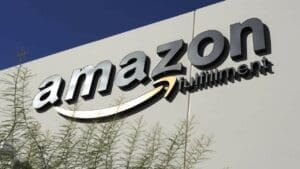 Speed of delivery can make or break online sales. Customer expectations for fast, free deliveries have increased since the pandemic hit, and the resulting surge in e-commerce sales has made delivery timeframes harder to hit. Amazon has set the bar for fast deliveries in the US, but the company has not always hit these same standards in other countries. As a result, Amazon is opening five new facilities in Quebec to speed up its delivery process. The company will add two sorting centers and its first three delivery stations in the province. Overall, the new facilities will create about 1,000 new jobs. The sorting centers will be located in Coteau-du-Lac and Longueuil, while the delivery stations will be located in Laval and Lachine.
Speed of delivery can make or break online sales. Customer expectations for fast, free deliveries have increased since the pandemic hit, and the resulting surge in e-commerce sales has made delivery timeframes harder to hit. Amazon has set the bar for fast deliveries in the US, but the company has not always hit these same standards in other countries. As a result, Amazon is opening five new facilities in Quebec to speed up its delivery process. The company will add two sorting centers and its first three delivery stations in the province. Overall, the new facilities will create about 1,000 new jobs. The sorting centers will be located in Coteau-du-Lac and Longueuil, while the delivery stations will be located in Laval and Lachine.
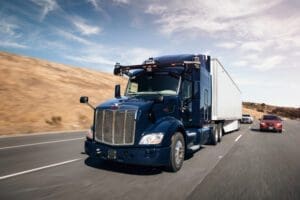 Interest in autonomous vehicles remains high, and a new entrant is ready to jump into the mix. Self-driving startup Aurora today announced a partnership with Paccar to build and deploy autonomous trucks. Aurora recently acquired Uber’s Advanced Technologies Group, the company’s driverless vehicle division, for around $4 billion. Now, it will work with Paccar to develop driverless-capable trucks starting with the Peterbilt 579 and the Kenworth T680. Aurora will test and validate the driverless Peterbilt and Kenworth trucks at Paccar’s technical center in Mt. Vernon, Washington, as well as on public roads. The companies expect them to be deployed in North America within the next several years.
Interest in autonomous vehicles remains high, and a new entrant is ready to jump into the mix. Self-driving startup Aurora today announced a partnership with Paccar to build and deploy autonomous trucks. Aurora recently acquired Uber’s Advanced Technologies Group, the company’s driverless vehicle division, for around $4 billion. Now, it will work with Paccar to develop driverless-capable trucks starting with the Peterbilt 579 and the Kenworth T680. Aurora will test and validate the driverless Peterbilt and Kenworth trucks at Paccar’s technical center in Mt. Vernon, Washington, as well as on public roads. The companies expect them to be deployed in North America within the next several years.
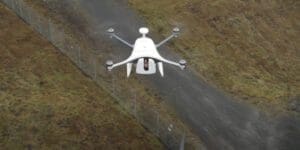 The Federal Aviation Administration (FAA) has approved the first fully-automated commercial drone flights, which enables companies to operate drones without direct supervision by human controllers or manned piloting. While the decision mandates that the drones only operate in rural areas at heights under 400 feet, it is still a big step in the right direction for farmers, miners, and others that have sought to use drones in their daily operations. According to the FAA’s statement, the drones could bring efficiencies to many of the industries that fuel our economy such as agriculture, mining, transportation and non-durable manufacturing.” Additionally, the FAA said that “the operations will achieve a reduction in environmental impact, as they will involve a small aircraft carrying no passengers or crew, rather than a manned aircraft of significantly greater size.”
The Federal Aviation Administration (FAA) has approved the first fully-automated commercial drone flights, which enables companies to operate drones without direct supervision by human controllers or manned piloting. While the decision mandates that the drones only operate in rural areas at heights under 400 feet, it is still a big step in the right direction for farmers, miners, and others that have sought to use drones in their daily operations. According to the FAA’s statement, the drones could bring efficiencies to many of the industries that fuel our economy such as agriculture, mining, transportation and non-durable manufacturing.” Additionally, the FAA said that “the operations will achieve a reduction in environmental impact, as they will involve a small aircraft carrying no passengers or crew, rather than a manned aircraft of significantly greater size.”
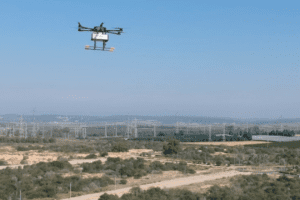 When one hears the term “drone delivery” the immediate thought is of an unmanned drone hovering over your house, slowly lowering an item you have ordered. However, this is just not the reality yet. And Pizza Hut Israel is exploring new ways to use drones as part of the delivery process. This summer, the company plans to use drones to drop multiple orders at government-approved landing zones, such as designated spaces in parking lots. Delivery drivers will collect orders from these makeshift drone ports and take them on the final leg to customers. The Ministry of Transportation is only allowing Pizza Hut to test its drone technology from one restaurant and within a designated “air bubble” measuring roughly 50 square miles in the north of the country. And in an effort to prevent pizza theft, the drone will not drop the order until the system recognizes that the driver is there to accept the item.
When one hears the term “drone delivery” the immediate thought is of an unmanned drone hovering over your house, slowly lowering an item you have ordered. However, this is just not the reality yet. And Pizza Hut Israel is exploring new ways to use drones as part of the delivery process. This summer, the company plans to use drones to drop multiple orders at government-approved landing zones, such as designated spaces in parking lots. Delivery drivers will collect orders from these makeshift drone ports and take them on the final leg to customers. The Ministry of Transportation is only allowing Pizza Hut to test its drone technology from one restaurant and within a designated “air bubble” measuring roughly 50 square miles in the north of the country. And in an effort to prevent pizza theft, the drone will not drop the order until the system recognizes that the driver is there to accept the item.
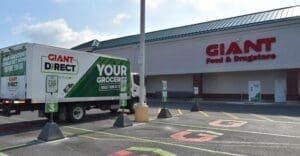 As online grocery shopping continues to surge, more and more retailers are turning to membership programs to bring in customers. The Giant Company announced that it is launching a membership program called Choice Pass that offers unlimited delivery and pickup orders for an annual fee. The membership program costs $98 per year and allows Giant Direct and Martin’s Direct online grocery customers to order as often as they like and never pay a delivery or pickup fee. Also available is a monthly option of $12.95 for unlimited free pickup and delivery transactions. Currently, individual orders carry a $2.95 fee and a minimum purchase of $30 for pickup and a $7.95 fee and a minimum transaction of $60 for delivery. Choice Pass replaces the PodPass membership plan, which carried an annual fee of $119.
As online grocery shopping continues to surge, more and more retailers are turning to membership programs to bring in customers. The Giant Company announced that it is launching a membership program called Choice Pass that offers unlimited delivery and pickup orders for an annual fee. The membership program costs $98 per year and allows Giant Direct and Martin’s Direct online grocery customers to order as often as they like and never pay a delivery or pickup fee. Also available is a monthly option of $12.95 for unlimited free pickup and delivery transactions. Currently, individual orders carry a $2.95 fee and a minimum purchase of $30 for pickup and a $7.95 fee and a minimum transaction of $60 for delivery. Choice Pass replaces the PodPass membership plan, which carried an annual fee of $119.
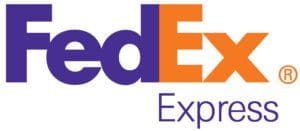 FedEx is adding a new residential delivery surcharge for large customers. The company will impose a 30-cent surcharge on US residential deliveries starting in mid-February for customers that shipped on average, more than 30,000 packages per week from January 4 to January 31. The new surcharge will apply to any combination of FedEx’s air, ground and last-mile delivery parcels that hit or exceed the 30,000 weekly volume threshold. However, those customers that only use the last-mile service SmartPost will be exempt from the charges. The COVID-19 pandemic and ensuing e-commerce volume surge has caused delivery costs to rise, thus prompting the surcharge.
FedEx is adding a new residential delivery surcharge for large customers. The company will impose a 30-cent surcharge on US residential deliveries starting in mid-February for customers that shipped on average, more than 30,000 packages per week from January 4 to January 31. The new surcharge will apply to any combination of FedEx’s air, ground and last-mile delivery parcels that hit or exceed the 30,000 weekly volume threshold. However, those customers that only use the last-mile service SmartPost will be exempt from the charges. The COVID-19 pandemic and ensuing e-commerce volume surge has caused delivery costs to rise, thus prompting the surcharge.
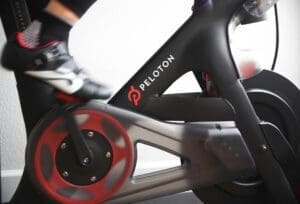 Delivery delays on just about everything have become the new norm during the pandemic. However, when that item costs over $2,000, late deliveries seem to bother consumers a lot more. That is what Peloton is dealing with right now. The pandemic helped the company’s value quadruple to over $40 billion; but with more orders came logistics nightmares. The company dealt with multiple shutdowns and delays at its factories, limiting its inventory and availability to ship bikes to customers. For many customers, the delivery date came and went without a bike; many reported receiving automated emails pushing out the delivery date by as much as a month or more. It will be interesting to see how this affects the company, especially when gyms are able to open up across the country.
Delivery delays on just about everything have become the new norm during the pandemic. However, when that item costs over $2,000, late deliveries seem to bother consumers a lot more. That is what Peloton is dealing with right now. The pandemic helped the company’s value quadruple to over $40 billion; but with more orders came logistics nightmares. The company dealt with multiple shutdowns and delays at its factories, limiting its inventory and availability to ship bikes to customers. For many customers, the delivery date came and went without a bike; many reported receiving automated emails pushing out the delivery date by as much as a month or more. It will be interesting to see how this affects the company, especially when gyms are able to open up across the country.
Over the last eight weeks, the cost of shipping goods from China to Europe has more than quadrupled, hitting record highs. This is mainly due to a shortage of empty containers stemming from the pandemic. The cost of shipping a 40-foot container from Asia to northern Europe has increased from about $2,000 in November to more than $9,000, according to shippers and importers. While thousands of empty containers were stranded in the US and Europe at the onset of the pandemic, when demand for Asian-made goods rebounded, competition for the containers sent freight rates soaring.
That’s all for this week. Enjoy the weekend and the song of the week, Times Like These by the Foo Fighters.
















